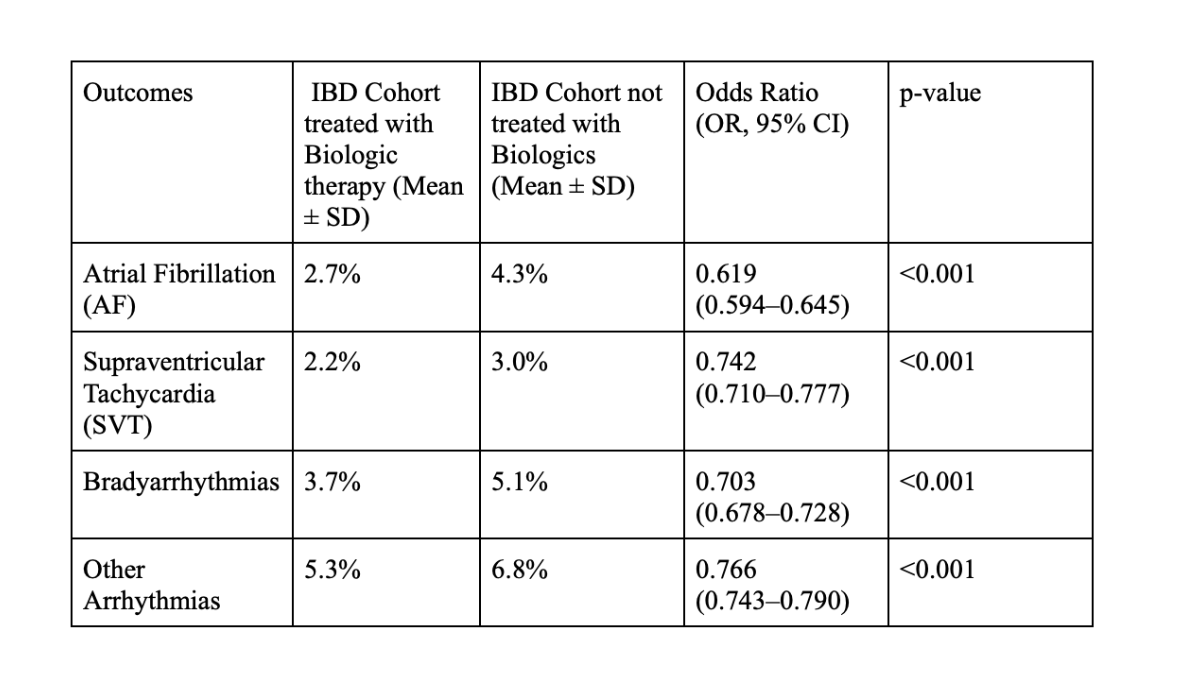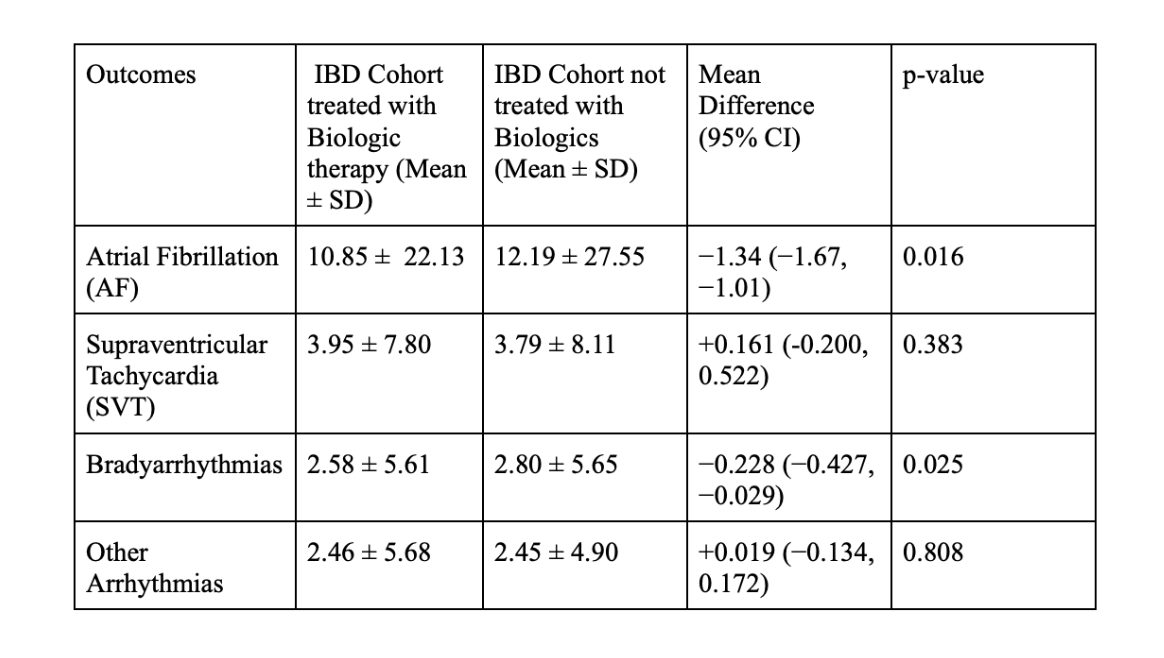Sunday Poster Session
Category: IBD
P1035 - Association Between Biologic Therapy and Incidence of Cardiac Arrhythmias in Patients With Inflammatory Bowel Disease: A Propensity Score-Matched Cohort Analysis Using Real-World Data
Sunday, October 26, 2025
3:30 PM - 7:00 PM PDT
Location: Exhibit Hall
.jpg)
Archit Garg, MD (he/him/his)
Saint Peter's University Hospital / Rutgers Robert Wood Johnson Medical School
New Brunswick, NJ
Presenting Author(s)
Archit Garg, MD1, Birgurman Singh, MD1, Aashi Garg, MD2, Pujitha Vallivedu Chennakesavulu, MD, MBBS3, Sunny Kumar, MD4, Umesh Bhagat, MD5, Louisa Recinos-Arenas, MD1
1Saint Peter's University Hospital / Rutgers Robert Wood Johnson Medical School, New Brunswick, NJ; 2Boston University School of Public Health, Boston, MA; 3Quinnipiac University Frank H Netter School of Medicine/ St Vincent medical center, Bridgeport, CT; 4Wright Center for Graduate Medical Education, Scranton, PA; 5Cleveland Clinic Foundation, Cleveland, OH
Introduction: Inflammatory Bowel Disease (IBD) has been increasingly recognized as a risk factor for cardiac arrhythmias. Recent studies have shown that the biologic therapy used for treatment of IBD can have a potential protective effect against fatal cardiovascular outcomes including arrhythmias. However, the data is limited. We conducted a comparative analysis between IBD patients with versus without biologic treatment on the incidence and burden of cardiac arrhythmias.
Methods: This retrospective cohort study utilized electronic health records from the TriNetX Research USA network. IBD was defined using ICD-10 codes for Crohn’s disease and ulcerative colitis. We identified two IBD patient cohorts: those exposed to biologic therapy (n=101,711) and those not receiving biologics (n=486,879). One-to-one propensity score matching (PSM) was performed based on demographics and clinical variables to balance baseline characteristics. Patients with arrhythmias prior to the index event were excluded. Outcomes included atrial fibrillation, AF (I48), supraventricular tachycardia, SVT (I47–I49), bradyarrhythmias (I44–R00), and other arrhythmias (I45–I49), assessed using risk difference, odds ratios (OR), Kaplan-Meier survival, and event frequency analyses.
Results: After propensity score matching, the cohorts were well-balanced (n=98,543 each). The biologics-treated IBD cohort had significantly reduced risk of AF (2.7% vs. 4.3%; OR 0.619, 95% CI: 0.594–0.645, p< 0.001), SVT (2.2% vs. 3.0%; OR 0.742, 95% CI: 0.710–0.777,p< 0.001), bradyarrhythmias (3.7% vs. 5.1%; OR 0.703, 95% CI: 0.678–0.728, p< 0.001), and other arrhythmias (5.3% vs. 6.8%; OR 0.766, 95% CI: 0.743–0.790, p< 0.001). Kaplan-Meier analysis showed higher arrhythmia-free survival in the biologics cohort across all arrhythmia subtypes (p< 0.001). The number of arrhythmia events was also lower in the biologics group for AF (mean 10.9 vs. 12.2, p=0.016) and bradyarrhythmias (2.6 vs. 2.8, p=0.025).
Discussion: Our large-scale real-world study shows that biologics were associated with significant reduction in the incidence of arrhythmias in IBD patients. This may be explained by the potential of the biologics to inhibit the systemic inflammatory cascade responsible for triggering the arrhythmias through electrical dysregulation, structural remodeling, and changes in the central and peripheral sympathetic outflows. Future prospective studies should investigate class-specific effects of biologics and validate the cardioprotective effect in IBD patients.

Figure: Table 1: Outcomes of cardiac arrhythmias in IBD cohort treated with biologic therapy versus IBD cohort not treated with biologic therapy

Figure: Table 2: Even burden outcomes in IBD cohort treated with biologic therapy versus IBD cohort not treated with biologic therapy
Disclosures:
Archit Garg indicated no relevant financial relationships.
Birgurman Singh indicated no relevant financial relationships.
Aashi Garg indicated no relevant financial relationships.
Pujitha Vallivedu Chennakesavulu indicated no relevant financial relationships.
Sunny Kumar indicated no relevant financial relationships.
Umesh Bhagat indicated no relevant financial relationships.
Louisa Recinos-Arenas indicated no relevant financial relationships.
Archit Garg, MD1, Birgurman Singh, MD1, Aashi Garg, MD2, Pujitha Vallivedu Chennakesavulu, MD, MBBS3, Sunny Kumar, MD4, Umesh Bhagat, MD5, Louisa Recinos-Arenas, MD1. P1035 - Association Between Biologic Therapy and Incidence of Cardiac Arrhythmias in Patients With Inflammatory Bowel Disease: A Propensity Score-Matched Cohort Analysis Using Real-World Data, ACG 2025 Annual Scientific Meeting Abstracts. Phoenix, AZ: American College of Gastroenterology.
1Saint Peter's University Hospital / Rutgers Robert Wood Johnson Medical School, New Brunswick, NJ; 2Boston University School of Public Health, Boston, MA; 3Quinnipiac University Frank H Netter School of Medicine/ St Vincent medical center, Bridgeport, CT; 4Wright Center for Graduate Medical Education, Scranton, PA; 5Cleveland Clinic Foundation, Cleveland, OH
Introduction: Inflammatory Bowel Disease (IBD) has been increasingly recognized as a risk factor for cardiac arrhythmias. Recent studies have shown that the biologic therapy used for treatment of IBD can have a potential protective effect against fatal cardiovascular outcomes including arrhythmias. However, the data is limited. We conducted a comparative analysis between IBD patients with versus without biologic treatment on the incidence and burden of cardiac arrhythmias.
Methods: This retrospective cohort study utilized electronic health records from the TriNetX Research USA network. IBD was defined using ICD-10 codes for Crohn’s disease and ulcerative colitis. We identified two IBD patient cohorts: those exposed to biologic therapy (n=101,711) and those not receiving biologics (n=486,879). One-to-one propensity score matching (PSM) was performed based on demographics and clinical variables to balance baseline characteristics. Patients with arrhythmias prior to the index event were excluded. Outcomes included atrial fibrillation, AF (I48), supraventricular tachycardia, SVT (I47–I49), bradyarrhythmias (I44–R00), and other arrhythmias (I45–I49), assessed using risk difference, odds ratios (OR), Kaplan-Meier survival, and event frequency analyses.
Results: After propensity score matching, the cohorts were well-balanced (n=98,543 each). The biologics-treated IBD cohort had significantly reduced risk of AF (2.7% vs. 4.3%; OR 0.619, 95% CI: 0.594–0.645, p< 0.001), SVT (2.2% vs. 3.0%; OR 0.742, 95% CI: 0.710–0.777,p< 0.001), bradyarrhythmias (3.7% vs. 5.1%; OR 0.703, 95% CI: 0.678–0.728, p< 0.001), and other arrhythmias (5.3% vs. 6.8%; OR 0.766, 95% CI: 0.743–0.790, p< 0.001). Kaplan-Meier analysis showed higher arrhythmia-free survival in the biologics cohort across all arrhythmia subtypes (p< 0.001). The number of arrhythmia events was also lower in the biologics group for AF (mean 10.9 vs. 12.2, p=0.016) and bradyarrhythmias (2.6 vs. 2.8, p=0.025).
Discussion: Our large-scale real-world study shows that biologics were associated with significant reduction in the incidence of arrhythmias in IBD patients. This may be explained by the potential of the biologics to inhibit the systemic inflammatory cascade responsible for triggering the arrhythmias through electrical dysregulation, structural remodeling, and changes in the central and peripheral sympathetic outflows. Future prospective studies should investigate class-specific effects of biologics and validate the cardioprotective effect in IBD patients.

Figure: Table 1: Outcomes of cardiac arrhythmias in IBD cohort treated with biologic therapy versus IBD cohort not treated with biologic therapy

Figure: Table 2: Even burden outcomes in IBD cohort treated with biologic therapy versus IBD cohort not treated with biologic therapy
Disclosures:
Archit Garg indicated no relevant financial relationships.
Birgurman Singh indicated no relevant financial relationships.
Aashi Garg indicated no relevant financial relationships.
Pujitha Vallivedu Chennakesavulu indicated no relevant financial relationships.
Sunny Kumar indicated no relevant financial relationships.
Umesh Bhagat indicated no relevant financial relationships.
Louisa Recinos-Arenas indicated no relevant financial relationships.
Archit Garg, MD1, Birgurman Singh, MD1, Aashi Garg, MD2, Pujitha Vallivedu Chennakesavulu, MD, MBBS3, Sunny Kumar, MD4, Umesh Bhagat, MD5, Louisa Recinos-Arenas, MD1. P1035 - Association Between Biologic Therapy and Incidence of Cardiac Arrhythmias in Patients With Inflammatory Bowel Disease: A Propensity Score-Matched Cohort Analysis Using Real-World Data, ACG 2025 Annual Scientific Meeting Abstracts. Phoenix, AZ: American College of Gastroenterology.
